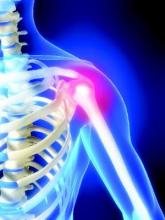In women, shoulder function is reduced early in the course of rheumatoid arthritis, based on a study published in Arthritis Research & Therapy.
At a mean of 20 months after diagnosis, women with rheumatoid arthritis (RA) had impaired shoulder muscle strength and shoulder-arm movement, and more shoulder pain, as compared to matched women without RA.
Lead author Dr. Annelie Bilberg of the University of Gothenburg in Sweden and her associates examined 103 women with rheumatoid arthritis and a reference group of 103 age-matched healthy women in a controlled cross-sectional study. Pain during shoulder and arm movements was assessed by the Borg symptom scale, and isometric muscle strength of the shoulder abductor muscles was assessed with an ISOBEX 3.0 dynamometer. Activity limitations were assessed using the Disabilities of the Arm, Shoulder and Hand (DASH) questionnaire. Physical workload did not significantly differ between the patient and control groups.
At the time of the assessment, 53% of the patients and 20% of the controls reported shoulder symptoms. Shoulder muscle strength in the patient group was about 65% of that in the control group, and patients’ hand-grip force was approximately 55% of that in the controls. DASH questionnaire results averaged 25.7 in the patient group and 2.6 in the control group. All of the differences were statistically significant.
Shoulder function, emphasizing shoulder muscle strength, should be assessed at disease onset, the researchers advised. A prospective follow-up study of shoulder function in patients with new-onset RA would help to explain the natural progression of the disease.
Read the full article here: Arthritis Care and Research 2015. doi:10.1186/s13075-015-0777-0.


